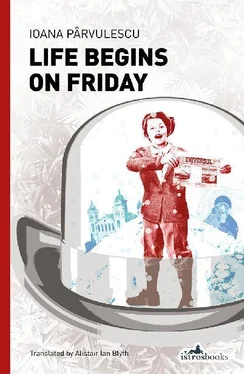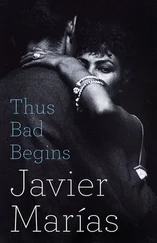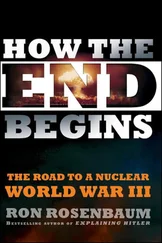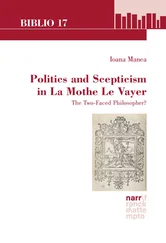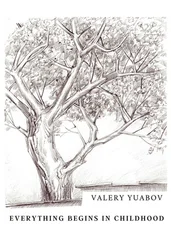‘Is everything well when it ends with death?’ interjected Dr Margulis in irritation.
‘This is what we ought to believe, is it not?’ replied Pavel, barely audibly, but without getting ruffled. ‘Here is a good ending to a novel. All is well when it ends with death. And I believe that is what will be once more.’
‘What, the good or death?’ said Agatha, losing her patience. She herself had encountered both. To her, too, Păvălucă seemed annoying. ‘I have not very well understood your predictions, Mr Mirto, but it is true that the Pythian said more or less the same kind of things.’
Hristea Livezeanu was slightly deaf and could not make out anything.
‘Well, if you want it to end with a wedding or a baptism, you should know that my brother is of a mind to marry next year, or at least to get engaged,’ said Pavel, looking at his brother, who, contrary to the custom, was gloomy, probably because of his tailcoat.
The following predictions were also made: man would go to the Moon, like in the tales of Jules Verne, the reds would, alas come to power, the whole Earth would be lit up by electricity, and, perhaps, a cure for tuberculosis would be found (this was Leon Margulis prediction, or ‘prognosis’, as he called it. General Algiu had cheered up somewhat. What was bad to him had been left behind or perhaps he had managed to overtake it. His words sounded differently than on ordinary occasions, as if he had lowered his guard when he stood up to speak.
‘For me, the window of my own future is closed. But through the country’s window I see good things, for the time being. And I would also tell the children to take delight in the present years, because they are more peaceful and happier than any years ever before! I do not know why I say this, how it came to me, but I am fully convinced that it is so. I do not believe in a rosy future; I have seen too many things in my life. I shall leave the young Boerescu to continue, since he is cleverer than I, both in words and in the battle against time.’
The young Costache felt old on New Year’s Eve and hoped to leave before the dancing began, although Mlle Mărculescu gazed at him, smiling enchantingly, her hair piled up around her head like a black halo. She did indeed look dazzling, and Iulia sometimes cast her wondering glances. Costache had known from the start of the evening what he would say. Standing, avoiding Iulia’s eye, looking only at the General, he smiled and, raising his glass, filled with the vintage of ’78, with which he had barely moistened his lips, he said: ‘As for the year on which we are just embarking, I have nothing much to say. But I predict that next century, the twentieth, will begin with General Ion Algiu at the helm of the Prefecture of Police. And that the prints of our fingertips will become the best means of identifying malefactors, who are able to alter their appearance with new moustaches.’
All kinds of comments were bandied back and forth. Some looked at Dan and his newly grown moustache, and a few examined their fingertips. Iulia, who was the penultimate speaker, remained seated, and Alexandru tapped his glass with a teaspoon to elicit silence for her. To the astonishment of all, she turned towards Dan: ‘Mr Crețu, how would you translate Vanity Fair ?’
‘Well, it’s Bâlciul Deșertăciunilor ( The Fair of Futilities ), isn’t it?’
‘ Formidable ,’ said Peppin Mirto, ‘amazing, you did not pause one instant to think. In fact, that is what it is like when you translate, either you find the right word straight away or you do not find it at all.’
‘My prediction for the future world,’ said Iulia, ‘is that it will be a fair of futilities or a market of vanities. And I also predict that women will no longer wear corsets,’ she added and then blushed furiously and gasped.
At which point Alexandru drank from his glass and Nicu whispered to Dan: ‘The Tuzla Lighthouse,’ and Dan gazed at him in puzzlement.
There was no time left for the rest of the game. Dan Crețu did not get to speak, to Marioara’s regret. She had been looking at him fixedly the whole evening, convincing herself that her first impression had not deceived her: there was nothing, absolutely nothing, mysterious about Mr Crețu; he was a man like any other. She gave a dimpled smile.
The hands of the clock neared twelve. The men uncorked the champagne from the buckets full of ice from Cișmigiu Lake, which was now half melted. At the first of the twelve chimes of the clock, the glasses clinked and the servants extinguished the lights for a few seconds, as if the world stood still. There were whoops and titters, the men’s shirt fronts shone in the darkness, and the children bumped up against the adults’ legs. Anica hid her head in her mother’s lap. The General coughed. Alexandru sought to discern Iulia’s outline in the darkness, her waist tightly contained within a corset. Hrista Livezeanu was bored and had a headache. Dan Crețu felt Nicu’s little hand grasp his. And then the world set in motion once more, the lights came on, enveloping guests and servants alike. It was as if they had met on the other bank of a river. They expected from the New Year all the good that the old one had denied them. The cannons on Metropolia Hill boomed over the city, causing one first to start and then to rejoice. The invisible enemies of the New Year were put to flight. And the words Happy New Year! could be heard so many times, spoken by so many voices in so many houses, that if all the years uttered had been placed end to end they would have stretched far into the future, a future which none could for the time being glimpse.
Dan Crețu alone remained to gaze, as the host so poetically put it, through the ‘window of the future,’ and the curiosity of the other guests could not have been greater. The glasses were once more filled with champagne and the foam dissolved like the worn lacework of the old year. Even if you are a rational and know that the newspapers alone have turned a man into a mysterious figure, into somebody different from everybody else, you still feel a slight thrill, like a cold draught in a well-heated room. And if you have been drinking Dom Perignon champagne, you might even believe that there is indeed something shady behind it all. Dan began to speak, as if talking to himself, without rising to his feet, without looking at anybody; it was as if he did not see them.
‘It isn’t good to look too far back into the past, and if your past is in the future, it’s even worse. I will forbid myself to think about my past. Perhaps in my mind, no longer ago than a year, my future was somewhere else entirely. Through a sudden reversal, my past blended with the future. Maybe, as someone here well put it, what was really is what will be. Maybe, as nobody has put it yet, but as somebody soon will say, the years stand still, like a landscape seen from a train window, while we are the ones in motion.’
‘We are the ones who are passing by now,’ interjected Mrs Marioara Livezeanu with a dimpled smile, peeved that Dan Crețu was playing the role of the mysterious stranger for the sake of the journalists. But fortunately, the band of folk musicians in red coats began a well-known waltz and the lady of the house announced: ‘Let the dancing begin! The ladies choose.’
The people of Bucharest were having a bad day. It had snowed, there were still twelve days till the end of the year, and twelve hours till the end of the day. On the large boulevards, where wheels advanced more slowly than legs, the festive lights were lit, but few people looked up to see them. Bluish droplets wept into the net of fairy lights hanging above the procession of wheels, which was without beginning and without end. Somewhere in that procession, like a small yellow splotch, was the old automobile of the journalist, Dan Crețu. He was on his way to the airport, having first dropped into the office of the magazine for which he worked. From the vehicle behind him, four ladies had alighted and set off on foot, impatient with the endlessly stopping traffic. Dan found the sullen air of the driver strange. He had a horn, which he kept blowing, not furiously, but methodically, maniacally. He kept changing lanes, gaining a few metres, only to lose them once more. When the cars drew side by side, Dan could see him in profile: he was smoking. He seemed familiar, but Dan could not place the face. He had black hair and was wearing a cap with a childlike tassel.
Читать дальше
